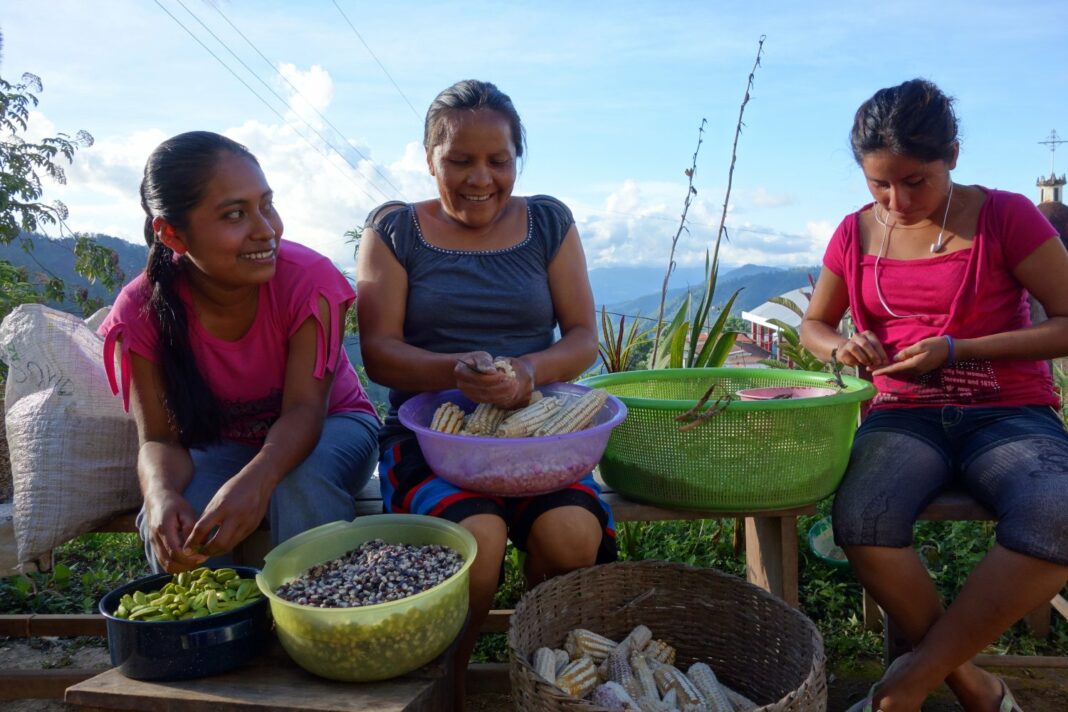By Annie Spiegelman, the Dirt Diva
“When I first heard about the idea of patenting a seed, or any kind of plant, I was absolutely horrified and I thought, surely that’ll never be allowed. You can’t own nature.”—Jane Goodall
While recently attending Grass Valley’s fabulous Wild & Scenic Film Festival (January 12-16), I had the chance to see the latest documentary from Collective Eye Films entitled SEED: The Untold Story. This is another visually gorgeous and informative film directed and produced by Taggart Siegel and Jon Betz, the Emmy-nominated, award-winning team that produced Queen of the Sun: What Are the Bees Telling Us? and The Real Dirt on Farmer John. SEED tells the story of independent farmers globally who are fighting the immense political and corporate power of chemical companies that now control the majority of our food.
Here’s the scoop: Twelve thousand years ago humans discovered agriculture by doing something as simple as saving seeds. A vast variety of seeds were passed down and propagated from generation to generation, farmer to farmer, garden geek to garden geek. These heirloom seeds were open-pollinated so they could be saved and planted year after year, producing new generations of plants.
Today, there are seeds created in biotech labs and patented by multinational corporations who believe they have the right to own agriculture. Often these genetically modified seeds are treated with pesticides and herbicides. They cannot be saved and replanted. National Geographic reports that up to 96 percent of the vegetable seeds that were available in 1903 have disappeared. In less than a century of industrial agriculture, our once abundant seed diversity from family farms and gardens has plummeted to a group of mass-produced varieties created by 10 agrichemical companies (with Syngenta, Bayer and Monsanto being at the top of my evildoer list).
SEED explores the history of agriculture and how today’s farmers are struggling to keep seed diversity alive. Throughout the film you’ll be introduced to seed savers, scientists, botanists, farmers and indigenous communities who are fighting battles against large chemical companies that now control the majority of food. Our ancestors worshipped and treasured the magic of seeds since the dawn of humankind. A seed is a tiny time capsule holding genetic data from our past. It was planted, saved and passed on to the next generation for food. A tiny seed may appear insignificant, but its downstream potential is truly profound. Maintaining diversity in our seed stock is crucial to our survival.
Despite the film’s occasionally dour message, it’s filled with a cast of colorful characters, chock full of scientific statistics, philosophical anecdotes and remarkable farming stories. Joseph Simcox, The Botanical Explorer and his motley crew, who resemble roadies-gone-wild-in-the-woods, will have you smiling as they travel around the world identifying food plant resources focusing on underutilized crops and wild species “for all the crazy people like me who sit there at night and look at bags of beans: It leaves us a mystery … ,” says Simcox, with the genuine awe of a kindergartner.
Vandana Shiva, founder of Navdanya, her nonprofit farm organization that campaigns for biodiversity and against corporate control of food, believes it is not an investment if it is destroying the planet. “The desire to save seeds comes from an ethical urge to defend life’s evolution,” Shiva says. “Two-hundred-fifty thousand farmers in India have committed suicide in areas where seed has been destroyed … where they have to buy the seed every year from Monsanto at a very high cost.” Shiva and her team have created 40 seed banks in India. They now take the seeds they have saved and bring them to the areas where farmers have given up.
The filmmakers weave various styles of animation to explain the evolution of seeds and the growth of agribusiness, as well as breathtaking time-lapse segments showing the transformation of seeds to seedlings. “Seeds are so crafty,” Goodall says. “There is a power. To me it’s magic. Its life force is so strong. There are seeds that rely on fire. There are seeds that tangle up in the hair of an animal that get carried for miles. There are seeds that can’t germinate unless they pass through the gut of an animal.”
Close-ups of stunning varieties of corn in New Mexico fields and spotted, polka-dotted beans in many colors look more like jewels than something edible. For hortiholics like me, it is a visual feast of seeds, soil and plants.
Ready to stick it to the chemical man? Get in touch with the filmmakers to bring a screening to your town at seedthemovie.com.






